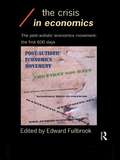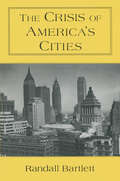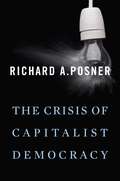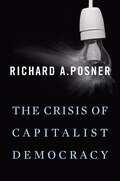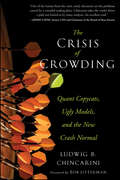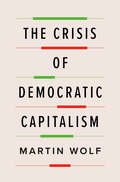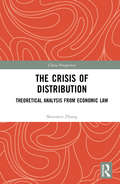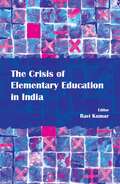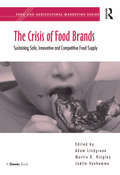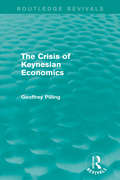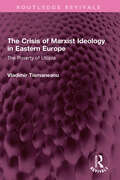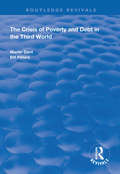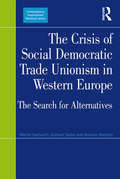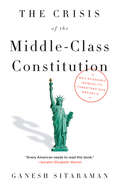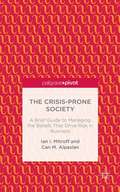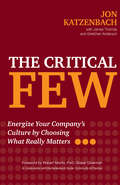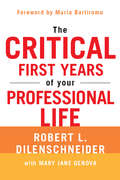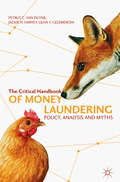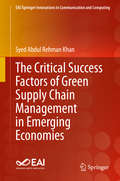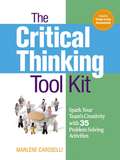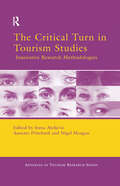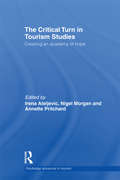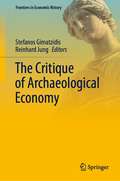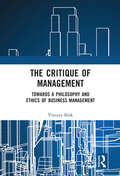- Table View
- List View
The Crisis in Economics
by Edward FullbrookEconomics can be pretty boring. Drier than Death Valley, the discipline is obsessed with mathematics and compounds this by arrogantly assuming its techniques can be brought to bear on the other social sciences. It wasn't going to be long, therefore, before students started complaining. The vast majority have voted with their feet and signed up for
The Crisis of America's Cities: Solutions for the Future, Lessons from the Past
by Randall BartlettAn original work on American cities and the ongoing "urban crisis". Using the metaphor of the socially constructed organization of space, Bartlett takes a broad view of the evolution of urban America, from its historical roots to the present; he then examines the way in which current policies have responded to, and affected the organization of space (covering housing, transportation, government and other urban problems). He concludes with a look to the future of American cities, how they will impact and be impacted on by changing commercial and labor markets, by the problems of poverty and cultural change. In an epilogue, he explores possible ways to overcome the "social dilemmas", while recognizing the difficulty of this undertaking.A thoroughly unique perspective to the study of cities, this book is about how space is used in America and how it changes as the "logic of location" evolves historically. Starting with the assumption that cities are fundamentally unnatural" phenomena, it unravels the interactions of technological advances that have made them possible and policies that have given them shape.
The Crisis of Capitalist Democracy
by Richard A. PosnerFollowing up on his timely and well-received book, "A Failure of Capitalism," Richard Posner steps back to take a longer view of the continuing crisis of democratic capitalism as the American and world economies crawl gradually back from the depths to which they had fallen in the autumn of 2008 and the winter of 2009. By means of a lucid narrative of the crisis and a series of analytical chapters pinpointing critical issues of economic collapse and gradual recovery, Posner helps non-technical readers understand business-cycle and financial economics, and financial and governmental institutions, practices, and transactions, while maintaining a neutrality impossible for persons professionally committed to one theory or another. He calls for fresh thinking about the business cycle that would build on the original ideas of Keynes. Central to these ideas is that of uncertainty as opposed to risk. Risk can be quantified and measured. Uncertainty cannot, and in this lies the inherent instability of a capitalist economy. As we emerge from the financial earthquake, a deficit aftershock rumbles. It is in reference to that potential aftershock, as well as to the government s stumbling efforts at financial regulatory reform, that Posner raises the question of the adequacy of our democratic institutions to the economic challenges heightened by the greatest economic crisis since the Great Depression. The crisis and the government s energetic response to it have enormously increased the national debt at the same time that structural defects in the American political system may make it impossible to pay down the debt by any means other than inflation or devaluation.
The Crisis of Capitalist Democracy
by Richard A. PosnerJudge Posner continues to react to the current economic crisis and reflect upon the impact on our views and reliance on capitalism. Posner helps non-technical readers understand business-cycle and financial economics, and financial and governmental institutions, practices, and transactions, while maintaining a neutrality impossible for persons professionally committed to one theory or another.
The Crisis of Crowding: Quant Copycats, Ugly Models, And The New Crash Normal (Bloomberg Ser. #162)
by Ludwig B. ChincariniA rare analytical look at the financial crisis using simple analysisThe economic crisis that began in 2008 revealed the numerous problems in our financial system, from the way mortgage loans were produced to the way Wall Street banks leveraged themselves. Curiously enough, however, most of the reasons for the banking collapse are very similar to the reasons that Long-Term Capital Management (LTCM), the largest hedge fund to date, collapsed in 1998. The Crisis of Crowding looks at LTCM in greater detail, with new information, for a more accurate perspective, examining how the subsequent hedge funds started by Meriwether and former partners were destroyed again by the lapse of judgement in allowing Lehman Brothers to fail. Covering the lessons that were ignored during LTCM's collapse but eventually connected to the financial crisis of 2008, the book presents a series of lessons for hedge funds and financial markets, including touching upon the circle of greed from homeowners to real estate agents to politicians to Wall Street.Guides the reader through the real story of Long-Term Capital Management with accurate descriptions, previously unpublished data, and interviewsDescribes the lessons that hedge funds, as well as the market, should have learned from LTCM's collapseExplores how the financial crisis and LTCM are a global phenomena rooted in failures to account for risk in crowded spaces with leverageExplains why quantitative finance is essential for every financial institution from risk management to valuation modeling to algorithmic tradingIs filled with simple quantitative analysis about the financial crisis, from the Quant Crisis of 2007 to the failure of Lehman Brothers to the Flash Crash of 2010A unique blend of storytelling and sound quantitative analysis, The Crisis of Crowding is one of the first books to offer an analytical look at the financial crisis rather than just an account of what happened. Also included are a layman's guide to the Dodd-Frank rules and what it means for the future, as well as an evaluation of the Fed's reaction to the crisis, QE1, QE2, and QE3.
The Crisis of Democratic Capitalism
by Martin WolfFrom the chief economics commentator of the Financial Times, a magnificent reckoning with how and why the marriage between democracy and capitalism is coming undone, and what can be done to reverse this terrifying dynamicMartin Wolf has long been one of the wisest voices on global economic issues. He has rarely been called an optimist, yet he has never been as worried as he is today. Liberal democracy is in recession, and authoritarianism is on the rise. The ties that ought to bind open markets to free and fair elections are threatened, even in democracy&’s heartlands, the United States and England. Around the world, powerful voices argue that capitalism is better without democracy; others argue that democracy is better without capitalism. This book is a forceful rejoinder to both views. Even as it offers a deep, lucid assessment of why this marriage has grown so strained, it makes clear why a divorce of capitalism from democracy would be a calamity for the world. They need each other even if they find it hard to life together. For all its flaws, argues Wolf, democratic capitalism remains far and away the best system for human flourishing. But something has gone seriously awry: the growth of prosperity has slowed, and the division of its fruits between the hypersuccessful few and the rest has become more unequal. The plutocrats have retreated to their bastions, where they pour scorn on government&’s ability to invest in the public goods needed to foster opportunity and sustainability. But the incoming flood of autocracy will rise to overwhelm them, too, in the end. Citizenship is not just a slogan or a romantic idea; it&’s the only idea that can save us, Wolf argues. Nothing has ever harmonized political and economic freedom better than a shared faith in the common good. This wise and rigorously fact-based exploration of the epic story of the dynamic between democracy and capitalism concludes with the lesson that our ideals and our interests not only should align, but must do so, for everyone&’s sake. Democracy itself is now at stake.
The Crisis of Distribution: Theoretical Analysis from Economic Law (China Perspectives)
by Shouwen ZhangThe crisis of distribution is one of the longest standing and most complicated issues facing human society. Imbued with social, political, historic, and cultural elements, it varies significantly across different countries as a result. As an emerging economy which transferred from a planned to a market economy, China has experienced large distribution gaps since it implemented the reform and "opening-up" policy in the early 1980s, requiring stronger economic law to mitigate and regulate the crisis of distribution. In this two-volume set, the author analyzes distribution crises from a theoretical perspective, before going on to propose law and policy solutions. In this first volume, he discusses the four main concepts and focus points of the crisis of distribution – distribution itself, the crises it faces, the rule of law, and development. Concentrating on the major distribution problems China faces in particular, the author proposes regulatory methods which can be used to overcome the distribution dilemma, such as tools from policy and economic law, and reiterates the significance of theory building in resolving the issues. The book should be of keen interest to researchers and students of law, economics, and political science.
The Crisis of Elementary Education in India
by Ravi KumarThe right to education has become the single most important agenda in the context of India`s development today, and this book addresses the issues that characterise the crisis in elementary education in the country. Bringing together diverse perspectives and analyses from scholars, activists and administrators, this volume covers issues of –policy –legal obligations –economic implications –gender –inclusive education Introducing the readers to the flavour of the most significant debates in education, this volume will provide educationists, social scientists and policy makers a gamut of analyses on diverse themes of elementary education at one place.
The Crisis of Food Brands: Sustaining Safe, Innovative and Competitive Food Supply (Food and Agricultural Marketing)
by Martin K. HingleyFood and agribusiness is one of the fastest changing global markets; change that is driven by technology, developments in manufacturing and supply, and a growing consumer engagement. The success of the agri-food industry and many of our household brand names will depend on how much you understand about these changes and the extent to which you can deliver secure and competitive products in the face of growing expectations about food safety and quality, as well as changing attitudes about the environment, human diet and nutrition, and animal welfare. The Crisis of Food Brands offers perspectives on many key aspects of these changes including the role of business, policy-makers, and the media in communicating with and engaging stakeholders about: o relevant and dynamic models of risk and crisis management; o the value of innovative and, sometimes controversial, food systems; o their buying behaviour and attitudes to movements such as organic and fair trade; o how and where we source and buy our food now (and in the future). The quality of the original research that underpins this book and the imagination and practicality with which the authors address its applications for the industry is first rate. Anyone with responsibility for marketing food, communicating about the food industry, or engaging with consumers will find this an important source of ideas and inspiration.
The Crisis of Keynesian Economics (Routledge Revivals)
by Geoffrey PillingGeoffrey Pilling’s treatment of this complex issue in political economy, first published in 1986, concentrates on a review of Keynes’ writings rather than the vast literature that has developed surrounding his work since the Second World War. It does, however, consider the work of the ‘Left Keynesians’, in particular that of Joan Robinson. The Crisis of Keynesian Economics has the potential to throw fresh light on some of the issues facing political leaders today, particularly so given that much of the Neo-Capitalist economic orthodoxy established during the 1980s has come under fresh criticism in recent years.
The Crisis of Marxist Ideology in Eastern Europe: The Poverty of Utopia (Routledge Revivals)
by Vladimir TismaneanuFirst published in 1988, The Crisis of Marxist Ideology in Eastern Europe states that since de-Stalinisation began in Eastern Europe, the ‘dead hand’ of institutional Marxism has been eroded by revisionist Marxism, with the turn to young Marx and the philosophy of human emancipation to undermine prevailing orthodoxies. But this revisionism clung to the old socialist dogmas and refused a total break with the system, and the effort eventually failed. The result was the emergence of a dissident counterculture rejecting the system entirely. Independent social movements (such as unofficial peace groups and trade unions like Solidarity) have given this counterculture a major role in Eastern Europe, whilst the ruling elites have responded with confusion. Tismaneanu concludes that the only hope for the anti-totalitarian intellectuals of Eastern Europe is to oppose the regimes with non-Marxist ideas – otherwise they will be permanently reduced to the status of a hopeless, albeit heroic minority. This book will be of interest to students of economics, political science and international relations.
The Crisis of Poverty and Debt in the Third World (Routledge Revivals)
by Bill Peters Martin DentFirst published in 1999, this volume, the first to be published in on Jubilee 2000, describes the plight of 52 of the poorest nations in the world and puts in detail the case for radical cancellation of past inert debt. The cost and benefit of this remission and the groundbreaking concordat of peoples and governments that could accompany it are examined in detail. It contains critiques of the economic bases of the World Bank and IMF approaches to debt management in developing economies, as manifested in structural adjustment programmes and their maintenance, misuse of excess reserves and the methods used to carry out restructuring and development projects. The British anti-slavery campaign saw a mobilisation of public opinion for a great cause. Using this as a source of inspiration, public opinion must again be mobilised for what amounts to the greatest opportunity for justice, compassion and forgiveness facing us all at the beginning of a new millennium.
The Crisis of Social Democratic Trade Unionism in Western Europe: The Search for Alternatives (Contemporary Employment Relations)
by Martin Upchurch Graham TaylorThere is a developing crisis of social democratic trade unionism in Western Europe; this volume outlines the crisis and examines the emerging alternatives. The authors define 'social democratic trade unionism' and its associated party-union nexus and explain how this traditional model has been threatened by social democracy's accommodation to neo-liberal restructuring and public service reform. Examining the experience of Sweden, Germany, Britain and France, the volume explores the historical rise and fall of social democratic trade unionism in each of these countries and probes the policy and practice of the European Trade Union Confederation. The authors critically examine the possibilities for a revival of social democratic unionism in terms of strategic policy and identity, offering suggestions for an alternative, radicalized political unionism. The research value of the book is highlighted by its focus on contemporary developments and its authors' intimate knowledge of the chosen countries.
The Crisis of the Middle-Class Constitution: Why Economic Inequality Threatens Our Republic
by Ganesh SitaramanIn this original, provocative contribution to the debate over economic inequality, Ganesh Sitaraman argues that a strong and sizable middle class is a prerequisite for America’s constitutional system. For most of Western history, Sitaraman argues, constitutional thinkers assumed economic inequality was inevitable and inescapable—and they designed governments to prevent class divisions from spilling over into class warfare. The American Constitution is different. Compared to Europe and the ancient world, America was a society of almost unprecedented economic equality, and the founding generation saw this equality as essential for the preservation of America’s republic. Over the next two centuries, generations of Americans fought to sustain the economic preconditions for our constitutional system. But today, with economic and political inequality on the rise, Sitaraman says Americans face a choice: Will we accept rising economic inequality and risk oligarchy or will we rebuild the middle class and reclaim our republic? The Crisis of the Middle-Class Constitution is a tour de force of history, philosophy, law, and politics. It makes a compelling case that inequality is more than just a moral or economic problem; it threatens the very core of our constitutional system.
The Crisis-Prone Society: A Brief Guide to Managing the Beliefs That Drive Risk in Business
by Can M. Alpaslan Ian I. MitroffThe Crisis-Prone Society offers preventative measures that can be taken by business professionals and scholars alike to alleviate the growing potential for crises today. These measures are distilled by close analysis of our recent social history of disasters.
The Critical Few: Energize Your Company’s Culture by Choosing What Really Matters
by James Thomas Jon Katzenbach Gretchen AndersonIn a global survey by the Katzenbach Center, 80 percent of respondents believed that their organization must evolve to succeed. But a full quarter of them reported that a change effort at their organization had resulted in no visible results. Why? The fate of any change effort depends on whether and how leaders engage their culture: the self-sustaining patterns of behaving, feeling, thinking, and believing that determine how things are done in an organization. Culture is implicit rather than explicit, emotional rather than rational—that's what makes it so hard to work with, but that's also what makes it so powerful. For the first time, this book lays out the Katzenbach Center's proven methodology for identifying your culture's three most critical elements: traits, characteristics that are at the heart of people's emotional connection to what they do; keystone behaviors, actions that would lead your company to succeed if they were replicated at a greater scale; and authentic informal leaders, people who have a high degree of “emotional intuition” or social connectedness.By leveraging these critical few elements, you can tap into a source of catalytic change within your organization. People will make an emotional, not just a rational, commitment to new initiatives. You will elicit enthusiasm and creativity and build the kind of powerful company that people recognize for its innate value and effectiveness.
The Critical First Years of Your Professional Life
by Robert L. Dilenschneider Mary Jane GenovaFaced with an unstable economy, recent college grads need more expert guidance than ever to land that dream job and make it rewarding and meaningful. This invaluable guide--revised to meet the specific challenges of today's fast-evolving job market--shows how you can use your talent, originality, and initiative to sharpen your competitive edge. The first years of your professional life are critical to long-term success in any field. The skills you acquire, the contacts you make, and the lessons you learn will help you remain involved, adaptable, and always ahead of the curve. Now a seasoned veteran of the workplace shares his insights, tips, and experiences in a thoroughly updated edition of a career-planning classic.
The Critical Handbook of Money Laundering: Policy, Analysis and Myths
by Petrus C. van Duyne Jackie H. Harvey Liliya Y. GelemerovaThe overarching aim of this book is to bring order to the subjects of money laundering and of the anti-money laundering frameworks that have been written over the past thirty years. It provides scholars, practitioners and policy makers with a guide to what is known of the subject thus far. The book examines critically the underlying assumptions of research and of policy-making in the field and offers a systematic review of the most important policy and academic literature on the subject.
The Critical Success Factors of Green Supply Chain Management in Emerging Economies (EAI/Springer Innovations in Communication and Computing)
by Syed Abdul KhanThis book outlines the scope of sustainability and green practice in supply chain operations, which has continued to grow with a rapid speed. The book includes core aspects of sustainability and green supply chain management philosophy and practice, covering general concepts, principles, strategies and best practices, which not only protect socio-environmental sustainability, but spur economic growth. The book will aid practitioners in using sustainable supply chains to reduce cost and improve service, as well as keep up-to-date with different features of green supply chains and logistics in a global market. The book will also be a valuable resource for candidates undertaking certification examinations and students studying for degrees in related fields of sustainability and green supply chain management.
The Critical Thinking Tool Kit: Spark Your Team's Creativity with 35 Problem Solving Activities
by Marlene CaroselliCaroselli, an author and former workforce trainer, offers 35 problem-solving activities to help managers and trainers improve the critical thinking and problem-solving abilities of their teams. Organized by quick, creative, and analytical thinking activities, they include individual, partner, and small and large group exercises, with objectives, supplies lists, time lengths, number of participants, preparation tips, procedures, questions, and extensions. Annotation ©2011 Book News, Inc. , Portland, OR (booknews. com)
The Critical Turn in Tourism Studies: Creating An Academy Of Hope (Advances In Tourism Ser.)
by Annette Pritchard Nigel Morgan Irena AteljevicNew approaches to tourism study demonstrate a notable ‘critical turn’ – a shift in thought that emphasises interpretative and critical modes of tourism inquiry. The chapters in this volume reflect this emerging critical school of tourism studies and represent a coordinated effort of tourism scholars whose work engages innovative research methodologies. Since such work has been dispersed across a variety of tourism-related and other research fields, this book responds to a pressing need to consolidate recent advances in a single text. Adopting a broad definition of ‘criticality’, the contributors seek to find ‘fresh’ ways of theorising tourism by locating the phenomenon in its wider political, economic, cultural and social contexts. The collection addresses the power relations underpinning the production of academic knowledge; presents a range of qualitative data collection methods which confront the field’s dominant (post)positivist approaches; foregrounds the emotional dynamics of research relations and explores the personal, the political and the situated nature of research journeys.The book has been divided into two parts, with the essays in the first part establishing a context-specific framework for engaging philosophical and theoretical debates in contemporary tourism enquiry. The second set of essays then present, discuss and critique specific methodologies, research techniques, methods of interpretation and writing strategies, all of which are in some sense illustrative of ‘critical’ tourism research. Contributors range from postgraduate students to established academics and are drawn from both the geopolitical margins and the ‘powerbases’ of the tourism academy. Their various relationships with the English-speaking academy thus range from relative ‘outsider’ to well-positioned ‘insider’ and as a result, their essays are reflective of a range of locations within the complexly spun web of academic power relations and social divisions.
The Critical Turn in Tourism Studies: Creating an Academy of Hope (Advances in Tourism)
by Annette Pritchard Nigel Morgan Irena AteljevicIn today’s increasingly complex tourism environment, decision-making requires a rounded, well-informed view of the whole. Critical distance should be encouraged, consultation and intellectual rigour should be the norm amongst managers and there needs to be a radical shift in our approach to educating future tourism and hospitality managers and researchers. This second edition intends to move the debate forward by exploring how critical tourism inquiry can make a difference in the world, linking tourism education driven by the values of empowerment, partnership and ethics to policy and practice. This volume is designed to enable its reader to think through vital concepts and theories relating to tourism and hospitality management, stimulate critical thinking and use multidisciplinary perspectives. The book is organized around three key ways of producing social change in and through tourism: critical thinking, critical education and critical action. Part one focuses on the importance of critical thinking in tourism research and deals with two key topics of our academic endeavours (i) tourism epistemology and theoretical and conceptual developments; (ii) research entanglements, knowledge production and reflexivity. Part two considers ‘the university as a site for activism’ by mapping out the moral, academic and practical role of educators in developing ethical and responsible graduates and explores the student experience. The final part attempts to provide new understandings of the ways in which social justice and social transformation can be achieved in and through tourism. This timely and thought provoking book which collectively questions tourism’s current and future role in societal development is essential reading for students, researchers and academics interested in Tourism & Hospitality.
The Critique of Archaeological Economy (Frontiers in Economic History)
by Stefanos Gimatzidis Reinhard JungThis book studies past economics from anthropological, archaeological, historical and sociological perspectives. By analyzing archeological and other evidence, it examines economic behavior and institutions in ancient societies. Adopting an interdisciplinary perspective, it critically discusses dominant economic models that have influenced the study of past economic relations in various disciplines, while at the same time highlighting alternative theoretical trajectories. In this regard, the book’s goal is not only to test theoretical models under scrutiny, but also to present evidence against the rationalization of past economic behavior according to the rules of modern markets. The contributing authors cover various topics, such as trade in the classical Greek world, concepts of commodity and value, and management of economic affluence.
The Critique of Management: Towards a Philosophy and Ethics of Business Management
by Vincent BlokThis book reflects on the nature of business management to contribute to the development of a philosophy and ethics of management. It engages in conceptual engineering of management to delineate the phenomenon of management and, as a result, to open a new perspective on management beyond its self-evident conceptualization. After questioning the self-evident concept of management, the author develops a philosophy of management with six dimensions of the nature of management: management as participation; management as resistance and responsive action; management as constitution of meaning; management as politico-economic governance; management as non-reductive stakeholder engagement; and management as epistemic insufficient entrepreneurship. These six dimensions of management are taken as points of departure to develop an integrated concept of business ethics, an individual competence for ethical business management, and a concept of ethical codes for corporate social responsible behavior. This new conception of philosophy of management and business ethics can guide future philosophical and empirical work on the nature of management. The Critique of Management is an excellent resource for researchers, students, and professionals interested in philosophy of management, business ethics, and corporate social responsibility.
